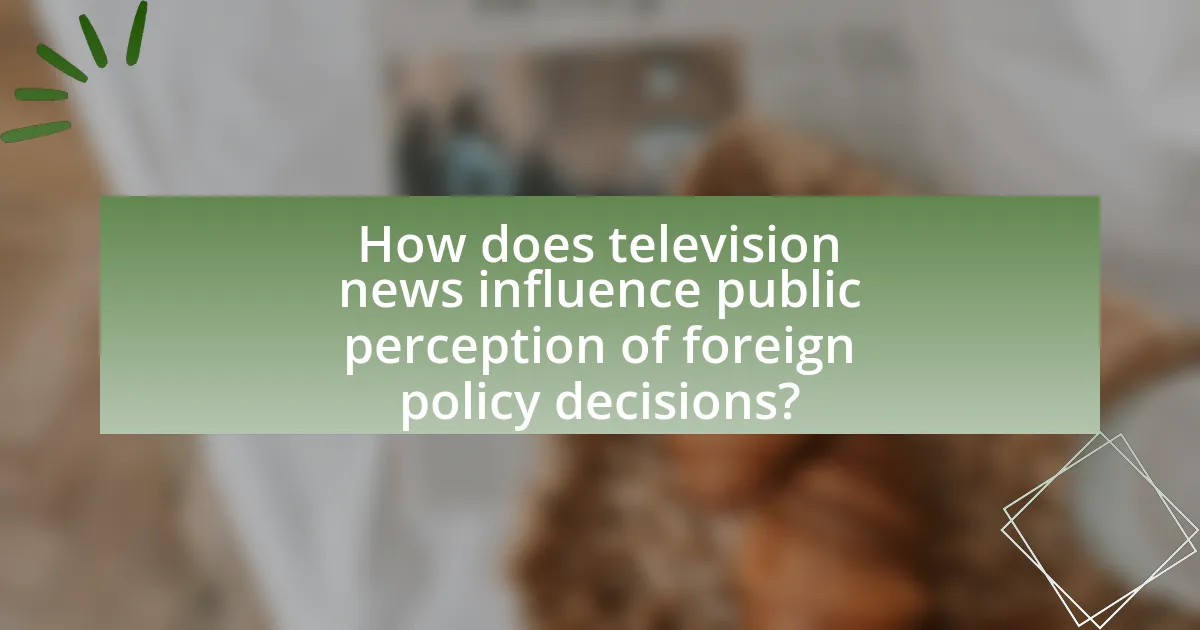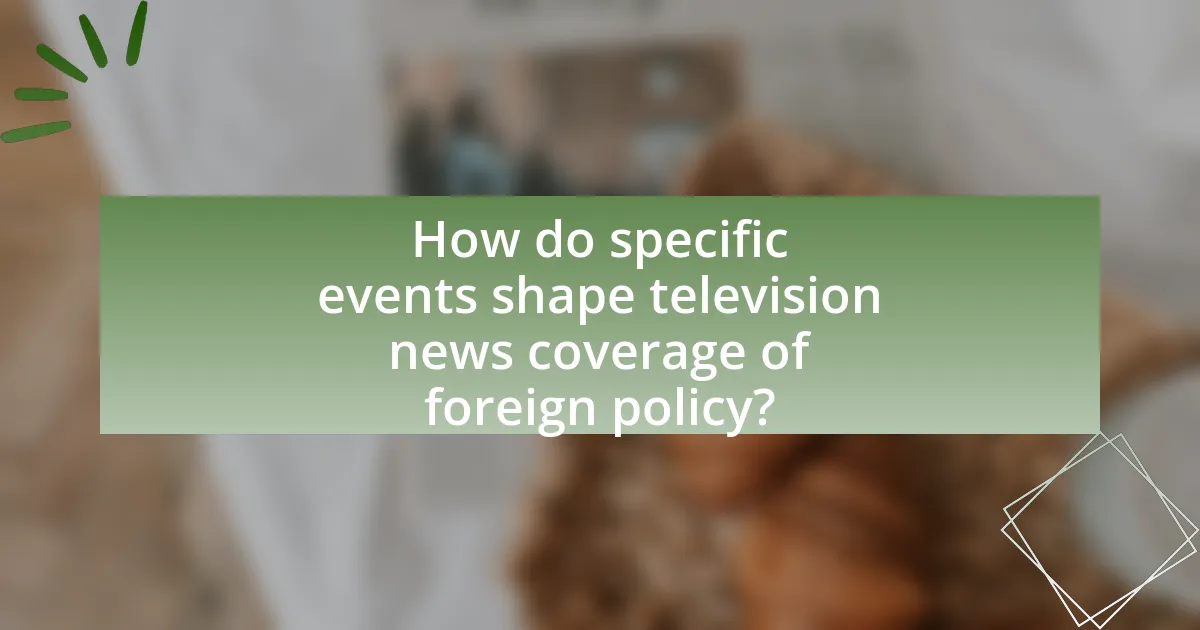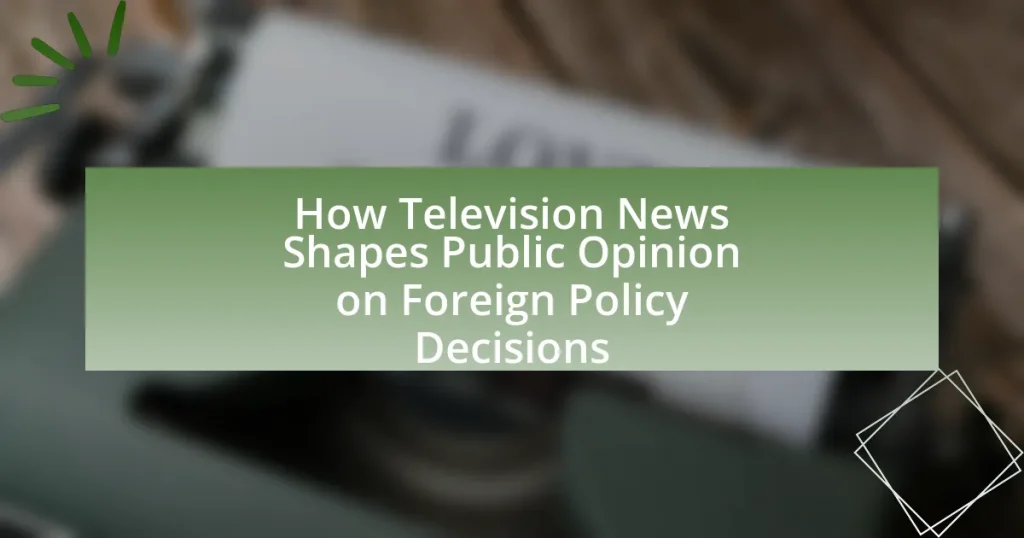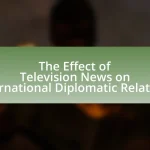Television news plays a critical role in shaping public opinion on foreign policy decisions by influencing perceptions, attitudes, and beliefs through framing, narrative selection, and emotional engagement. The article examines how the presentation of foreign policy events can alter public understanding, as evidenced by historical examples like the Vietnam War and the Iraq War. It discusses the psychological mechanisms of media influence, the significance of television as a primary news source, and the impact of biased reporting on public trust. Additionally, the article highlights the ethical responsibilities of journalists and the importance of media literacy for audiences to critically engage with foreign policy coverage.

How does television news influence public perception of foreign policy decisions?
Television news significantly influences public perception of foreign policy decisions by framing issues, selecting specific narratives, and shaping the emotional responses of viewers. Research indicates that the way news outlets present foreign policy events can alter public understanding and attitudes; for instance, studies show that when news coverage emphasizes military action, public support for such interventions tends to increase. Additionally, the use of visuals and emotional storytelling in television news can create a sense of urgency or threat, further impacting how the audience perceives the necessity and justification of foreign policy actions. This influence is evident in historical contexts, such as the Vietnam War, where televised images of conflict swayed public opinion against the war, demonstrating the powerful role of television news in shaping perceptions of foreign policy.
What role does television news play in shaping public opinion?
Television news plays a crucial role in shaping public opinion by influencing perceptions, attitudes, and beliefs about various issues, including foreign policy decisions. Research indicates that the framing of news stories, the selection of topics, and the portrayal of events can significantly affect how audiences interpret information. For instance, a study by Iyengar and Kinder (1987) demonstrated that different framing of the same event could lead to varying public responses, highlighting the power of television news in guiding public sentiment. Additionally, television news serves as a primary source of information for many individuals, often shaping their understanding of complex issues through simplified narratives and visual imagery. This influence is particularly evident during critical events, such as military interventions or diplomatic negotiations, where the coverage can sway public support or opposition.
How does the framing of news stories affect audience interpretation?
The framing of news stories significantly affects audience interpretation by influencing how information is perceived and understood. When news outlets emphasize certain aspects of a story while downplaying others, they shape the narrative and guide audience emotions and opinions. For example, a study by Entman (1993) highlights that framing can lead to different interpretations of the same event, such as portraying a military intervention as a humanitarian effort versus an act of aggression, which can sway public support for foreign policy decisions. This selective presentation of information can create biases, leading audiences to form opinions based on the framed narrative rather than objective facts.
What psychological mechanisms are involved in media influence?
Media influence operates through several psychological mechanisms, including priming, framing, and cultivation. Priming occurs when media exposure activates certain associations in viewers’ minds, affecting their subsequent judgments and behaviors. For instance, repeated coverage of a specific foreign policy issue can lead individuals to prioritize that issue in their evaluations of political leaders. Framing involves presenting information in a particular way that shapes how audiences interpret it; for example, portraying a military intervention as a humanitarian effort can elicit more favorable public support. Cultivation theory suggests that long-term exposure to media content can shape viewers’ perceptions of reality, leading them to adopt beliefs that align with the media’s portrayal of foreign policy. Research by George Gerbner highlights that heavy television viewers are more likely to perceive the world as a dangerous place, influencing their opinions on national security and foreign policy decisions.
Why is television news a significant source of information on foreign policy?
Television news is a significant source of information on foreign policy because it provides immediate access to global events and expert analysis, shaping public understanding and opinion. The visual and auditory elements of television enhance engagement, making complex foreign policy issues more relatable and easier to comprehend for the general audience. According to a Pew Research Center study, approximately 57% of Americans rely on television as their primary source for news about international affairs, highlighting its influential role in informing public perception and discourse on foreign policy matters.
How does television news compare to other media sources in impact?
Television news has a significant impact on public opinion compared to other media sources due to its visual and auditory elements, which enhance engagement and retention of information. Research indicates that television news is often perceived as more credible and authoritative, with studies showing that 55% of Americans trust television news more than online sources or print media. This trust is crucial in shaping public perceptions, particularly regarding foreign policy decisions, as visual storytelling can evoke emotional responses that influence viewers’ opinions more effectively than text-based media.
What demographic factors influence the consumption of television news?
Demographic factors that influence the consumption of television news include age, education level, income, and geographic location. Research indicates that younger audiences tend to consume news through digital platforms rather than traditional television, while older demographics are more likely to watch television news regularly. Additionally, individuals with higher education levels often seek out more in-depth news coverage, while those with lower income may rely on local news broadcasts. Geographic location also plays a role, as urban residents typically have access to a wider variety of news channels compared to rural populations. These factors collectively shape viewing habits and preferences in television news consumption.
What are the potential consequences of television news on public opinion?
Television news significantly influences public opinion by shaping perceptions, attitudes, and beliefs about various issues, including foreign policy. Research indicates that the framing of news stories can lead to changes in how the public interprets events and policies. For example, a study by Iyengar and Kinder (1987) demonstrated that different frames in news coverage can alter viewers’ opinions on social issues, highlighting the power of media narratives. Additionally, the agenda-setting function of television news can prioritize certain topics, leading the public to perceive them as more important, as shown in the work of McCombs and Shaw (1972). These consequences underscore the critical role television news plays in informing and influencing public discourse on foreign policy decisions.
How can biased reporting affect public trust in foreign policy decisions?
Biased reporting can significantly undermine public trust in foreign policy decisions by presenting skewed narratives that distort reality. When media outlets selectively highlight certain facts or perspectives while omitting others, they create a misleading portrayal of events, which can lead to public skepticism about the motives and effectiveness of government actions. For instance, studies have shown that when news coverage emphasizes negative aspects of a foreign policy initiative, public support for that initiative declines, as seen in the coverage of the Iraq War, where negative reporting contributed to a decrease in trust towards the U.S. government. This erosion of trust can result in a disengaged electorate, less willingness to support foreign policy initiatives, and increased polarization regarding international issues.
What are the implications of sensationalism in foreign policy reporting?
Sensationalism in foreign policy reporting leads to distorted public perceptions and can influence policy decisions. When news outlets prioritize dramatic narratives over factual reporting, they create an environment where fear and misinformation thrive, often resulting in public support for aggressive foreign policies. For instance, during the lead-up to the Iraq War in 2003, sensationalized reports about weapons of mass destruction contributed to widespread public belief in an imminent threat, which ultimately justified military intervention. This illustrates how sensationalism can manipulate public opinion, leading to decisions that may not align with factual realities or long-term national interests.

How do specific events shape television news coverage of foreign policy?
Specific events significantly influence television news coverage of foreign policy by determining the narrative focus and framing of issues. For instance, the September 11 attacks in 2001 led to an increased emphasis on national security and terrorism in news reporting, shaping public perception of foreign policy priorities. Coverage often shifts in response to events such as military interventions, diplomatic crises, or humanitarian disasters, which can lead to heightened media attention and altered public discourse. Research indicates that events like the Iraq War in 2003 resulted in polarized coverage, affecting public opinion and support for foreign policy decisions. Thus, specific events act as catalysts that shape the themes and angles of television news coverage, ultimately influencing how the public perceives foreign policy issues.
What major events have influenced television news narratives on foreign policy?
Major events that have influenced television news narratives on foreign policy include the Vietnam War, the Gulf War, the September 11 attacks, and the Iraq War. The Vietnam War marked a significant shift in how television news portrayed military conflicts, emphasizing graphic imagery and the human cost, which led to public skepticism about government narratives. The Gulf War showcased the power of 24-hour news coverage, with live broadcasts shaping perceptions of military success and American intervention. The September 11 attacks dramatically altered foreign policy narratives, leading to a focus on terrorism and national security, while the Iraq War further polarized public opinion, as televised coverage revealed the complexities and consequences of military action. These events collectively shaped the framework through which television news presents foreign policy issues, influencing public opinion and government accountability.
How did the coverage of the Iraq War shape public opinion?
The coverage of the Iraq War significantly shaped public opinion by influencing perceptions of the conflict and the U.S. government’s rationale for military intervention. Extensive media reporting, particularly through television news, highlighted both the human cost of the war and the controversial justifications provided by officials, such as the presence of weapons of mass destruction. According to a Pew Research Center study, public support for the war peaked at 72% shortly after the invasion in 2003 but declined to 29% by 2008, reflecting the impact of media coverage on public sentiment as reports of casualties and the war’s challenges became more prominent. This shift illustrates how the framing of the war in news coverage directly affected public attitudes and trust in government narratives.
What role did the Arab Spring play in altering foreign policy discussions?
The Arab Spring significantly altered foreign policy discussions by prompting a reevaluation of U.S. and Western engagement strategies in the Middle East. The uprisings highlighted the limitations of supporting authoritarian regimes for stability, leading to a shift towards prioritizing democratic values and human rights in diplomatic relations. For instance, the U.S. response to the protests in Egypt and Libya demonstrated a willingness to reconsider alliances, as seen in the decision to support the ousting of Hosni Mubarak and the military intervention in Libya. This shift was influenced by the rapid dissemination of information through television news and social media, which shaped public opinion and pressured policymakers to respond to the demands for reform and accountability in the region.
How do journalists decide what foreign policy stories to cover?
Journalists decide what foreign policy stories to cover based on factors such as newsworthiness, audience interest, and the potential impact on public opinion. Newsworthiness is often determined by the significance of the event, its timeliness, and its relevance to current geopolitical issues. Audience interest plays a crucial role, as journalists aim to engage viewers with stories that resonate with their concerns and values. Additionally, the potential impact of a story on public opinion can influence coverage decisions, as journalists recognize their role in shaping perceptions of foreign policy. For instance, major events like international conflicts or diplomatic breakthroughs are prioritized due to their immediate relevance and potential to affect public discourse.
What factors influence the selection of foreign policy topics in news reporting?
The selection of foreign policy topics in news reporting is influenced by factors such as audience interest, geopolitical significance, and media ownership. Audience interest drives news outlets to cover topics that resonate with viewers, ensuring higher engagement and ratings. Geopolitical significance determines which issues are deemed newsworthy based on their impact on national security or international relations. Media ownership also plays a crucial role, as corporate interests can shape editorial choices, leading to selective coverage of foreign policy topics that align with the owners’ perspectives or agendas. For instance, studies have shown that news coverage often prioritizes conflicts or crises that attract public attention, thereby influencing public perception and opinion on foreign policy decisions.
How does audience demand shape news coverage of foreign policy issues?
Audience demand significantly influences news coverage of foreign policy issues by dictating the topics that receive attention and the framing of those topics. News organizations prioritize stories that align with audience interests, often focusing on sensational or emotionally charged events, which can lead to a skewed representation of foreign policy matters. For instance, during the Iraq War, media coverage was heavily influenced by public interest in military actions, resulting in extensive reporting on troop deployments and combat, while less attention was given to diplomatic efforts or the complexities of post-war reconstruction. This trend is supported by research indicating that higher audience engagement correlates with increased coverage of specific foreign policy issues, as seen in studies by the Pew Research Center, which found that public interest can drive news outlets to cover certain topics more extensively.
What are the ethical considerations in reporting foreign policy news?
Ethical considerations in reporting foreign policy news include accuracy, impartiality, and the potential impact on public perception and international relations. Journalists must ensure that the information presented is factually correct and well-sourced to avoid misinformation, which can lead to public misunderstanding and misguided opinions about foreign policy. Impartiality is crucial, as biased reporting can skew public perception and influence political decisions, potentially exacerbating conflicts. Additionally, reporters must consider the consequences of their coverage, as sensationalism or misrepresentation can harm diplomatic relations and affect the lives of individuals in affected regions. For instance, the coverage of the Iraq War in 2003 faced criticism for lacking objectivity, which contributed to polarized public opinion and debates about the legitimacy of military intervention.
How do journalists balance objectivity and advocacy in foreign policy reporting?
Journalists balance objectivity and advocacy in foreign policy reporting by adhering to ethical standards while providing context and analysis. They strive to present facts and multiple viewpoints to maintain credibility, often using verified sources and data to support their narratives. For instance, the Society of Professional Journalists emphasizes the importance of accuracy and fairness, which guides journalists in their reporting. Additionally, journalists may include expert opinions and diverse perspectives to enrich the discourse, ensuring that advocacy does not overshadow factual reporting. This approach helps them navigate the complexities of foreign policy while fostering informed public opinion.
What responsibilities do news organizations have in informing the public?
News organizations have the responsibility to provide accurate, timely, and comprehensive information to the public. This includes fact-checking, presenting multiple viewpoints, and ensuring transparency in reporting to foster informed citizenry. For instance, the Pew Research Center found that 62% of Americans believe news organizations should strive for accuracy over speed, highlighting the public’s expectation for reliable information. Additionally, news organizations must adhere to ethical standards, such as minimizing harm and avoiding sensationalism, to maintain trust and credibility.

What strategies can audiences use to critically engage with television news on foreign policy?
Audiences can critically engage with television news on foreign policy by employing strategies such as cross-referencing multiple news sources, analyzing the framing of stories, and questioning the underlying assumptions presented. Cross-referencing multiple news sources allows audiences to compare different perspectives and identify potential biases, as studies show that diverse media consumption can lead to a more nuanced understanding of complex issues. Analyzing the framing of stories helps audiences recognize how language and imagery can influence perceptions; for instance, the choice of words like “intervention” versus “invasion” can shape public sentiment. Questioning underlying assumptions encourages audiences to think critically about the motivations behind news coverage, as research indicates that understanding the context and interests of media outlets can reveal biases in reporting.
How can viewers identify bias in television news coverage?
Viewers can identify bias in television news coverage by analyzing the language, tone, and framing of the stories presented. For instance, biased coverage often employs emotionally charged language or selectively highlights certain facts while omitting others, which can skew public perception. Research from the Pew Research Center indicates that 62% of Americans believe news organizations tend to favor one side in their reporting, illustrating the prevalence of perceived bias. Additionally, viewers should compare coverage across multiple news outlets to identify discrepancies in reporting on the same event, as differing narratives can reveal underlying biases.
What tools are available for analyzing news sources for credibility?
Tools available for analyzing news sources for credibility include FactCheck.org, Snopes, and Media Bias/Fact Check. FactCheck.org provides nonpartisan analysis of factual claims in news articles, while Snopes specializes in debunking misinformation and urban legends. Media Bias/Fact Check assesses the bias and factual accuracy of various news outlets, offering a comprehensive database for users to evaluate credibility. These tools are widely recognized for their reliability and are frequently cited in academic research on media credibility.
How can audiences differentiate between opinion and factual reporting?
Audiences can differentiate between opinion and factual reporting by analyzing the language and structure used in the content. Factual reporting presents verifiable information, often supported by data, quotes from credible sources, and objective language, while opinion pieces utilize subjective language, personal viewpoints, and persuasive techniques. For instance, a news article stating “The government implemented a new policy to reduce emissions” is factual, as it can be verified through official records, whereas an opinion piece might say “The new policy is a misguided attempt to address climate change,” reflecting a personal judgment rather than an objective fact. This distinction is crucial for understanding how television news influences public perception of foreign policy decisions.
What practices can enhance critical thinking about foreign policy news?
Engaging in diverse media consumption enhances critical thinking about foreign policy news. By exposing oneself to various perspectives, including international news outlets, academic journals, and expert analyses, individuals can better understand the complexities of foreign policy issues. Research indicates that individuals who consume a range of viewpoints are more likely to develop nuanced opinions and challenge their biases, as demonstrated in studies on media literacy and critical thinking. Furthermore, actively questioning the sources of information, analyzing the framing of news stories, and discussing these topics with others can deepen understanding and promote critical evaluation of foreign policy narratives.
How can audiences seek diverse perspectives on foreign policy issues?
Audiences can seek diverse perspectives on foreign policy issues by engaging with a variety of news sources, including international media outlets, independent journalism, and expert analyses. This approach allows individuals to access differing viewpoints and interpretations of foreign policy events. For instance, research indicates that exposure to multiple news sources can enhance understanding and reduce bias, as demonstrated in studies by the Pew Research Center, which found that individuals who consume news from a range of platforms are more likely to recognize the complexity of global issues. Additionally, participating in public forums, attending lectures, and following think tanks that specialize in foreign policy can further broaden perspectives.
What role does media literacy play in understanding foreign policy coverage?
Media literacy is essential for critically analyzing foreign policy coverage, as it enables individuals to discern biases, evaluate sources, and understand the framing of information. By developing media literacy skills, audiences can better assess how television news influences public perception of foreign policy decisions, recognizing that media outlets may present information with particular slants or omissions. Research indicates that individuals with higher media literacy are more likely to question the narratives presented in news coverage, leading to a more informed public discourse on foreign policy issues. For instance, studies show that media literacy education can enhance critical thinking skills, allowing viewers to identify propaganda and misinformation, which is crucial in a landscape where foreign policy is often subject to political agendas.




